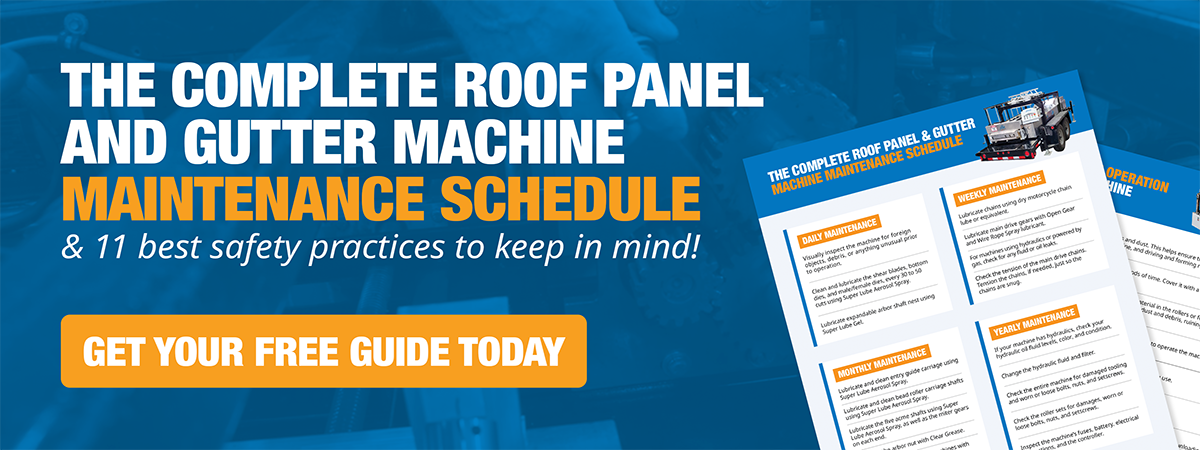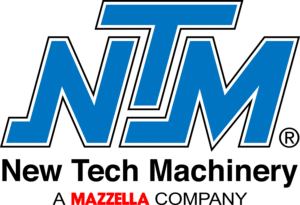Why Material Matters: Portable Rollforming Problems Using Bad Metal Coil
When operating your portable roof panel machine, whether you’re just getting started or already familiar with this type of equipment, knowing what metal coil you can run is critical. Otherwise, you’re likely to cause damage to your machine or run into installation or rollforming problems using bad metal coil or the wrong material type.
During the research and development phase of designing a portable rollforming machine, New Tech Machinery’s (NTM) Engineering department tests the machine using different material types, thicknesses, and grades to see how it performs safely. NTM’s Service department has also helped many machine operators fix problems associated with running the wrong kinds of material or material outside the recommended scope.
In this article, we’ll discuss what materials you can run through your NTM machine, the potential risks of running the wrong material types, what constitutes bad metal coil, and what could happen if you use low-quality coil in your portable rollformer.
Acceptable Metal Roofing Materials for New Tech Machinery Portable Rollformers
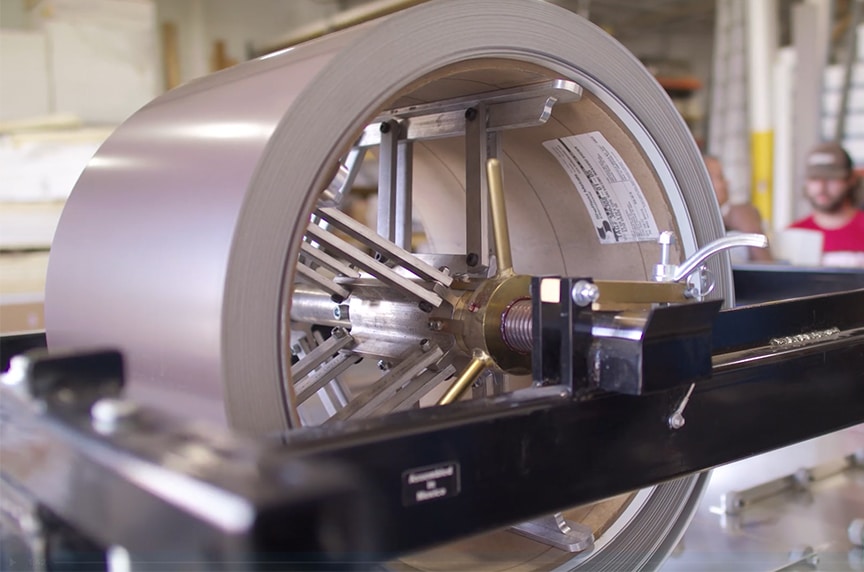
This article will only discuss what metal roofing materials and thicknesses you can safely run through a New Tech Machinery portable rollformer. We will not discuss panel profile testing or engineering, which your roofing manufacturer will dictate.
NTM designs its roof panel machines to run specific metal material thicknesses and grades commonly used in the architectural metal roofing and wall industry. These material types are popular because of their aesthetics, formability, strength, durability, and availability in the marketplace.
For example, NTM’s SSH™ MultiPro Roof Panel Machine can run the following recommended materials:
- 28 gauge to 24 gauge painted, galvanized, aluminized steel
- .027” to .040” painted aluminum
- 16 oz. to 20 oz. 3/4 hard copper
- 26 gauge terne-coat stainless steel
Grade 50 is recommended for 24 to 22-gauge steel and 28-gauge to 26-gauge steel. However, Grade 80 is acceptable with adjustments for 28-gauge to 26-gauge steel (depending on the profile). NTM recommends using Class D Grade 50 steel because of its lock-forming quality. Lock-forming quality means that the metal material and coating won’t crack when bent or formed by the machine.
Each portable roof panel machine can only run certain material types and thicknesses. For example, notching functionality in the SSQ II is not recommended when running copper or terne coat stainless steel. It’s important to check your operator’s manual or newtechmachinery.com for details or contact one of our rollforming specialists for assistance.

Portable Rollforming Problems Using the Wrong Metal Roofing Material
If you use materials, thicknesses, or grades outside of what is recommended by New Tech Machinery, you could encounter varying issues or cause damage to your machine. Let’s walk through some problems that could happen if you use unrecommended materials:
Wearing Out or Damaging the Forming or Drive Rollers
Metal materials have different properties and hardnesses. Harder materials may resist being permanently indented or bent by the forming rollers to the desired profile and will likely wear them out. Also, using materials outside of what’s recommended by New Tech Machinery, like bonderized or corten steel, could cause issues with the forming or drive rollers and void your warranty.
Potentially Crashing the Machine
A significant risk of using any metal outside of what is approved is that it could crash your machine. Higher tensile strength material can try to spring back, attempt to return to its original shape, and crash inside the machine. Any crash inside the machine involves a lot of time and labor to cut out the material, clean out and inspect your machine of any damage, and ensure it gets back to the proper alignment.
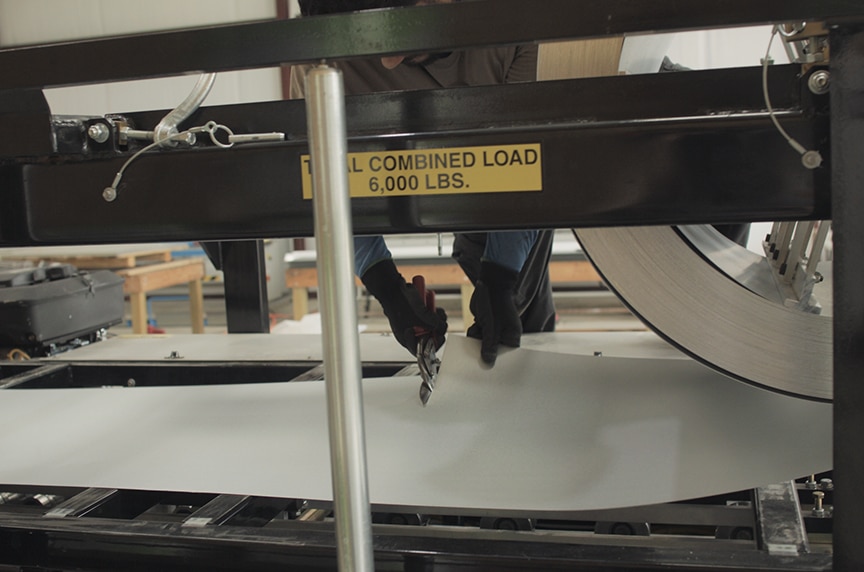
Voiding the Manufacturer’s Warranty
If you run materials outside of what has been tested and cleared by New Tech Machinery, your warranty is voided and won’t cover any problems you encounter. This could be an expensive issue depending on whether there is damage to your machine or if you need new parts.
At the first sign of any issue with your coil or metal material, if you’ve already started running it through your machine, stop and get a new coil. If you notice any issues with the material (like camber or oil canning) before feeding it into your machine, don’t use it, and contact your manufacturer or coil supplier.
Defects to Look for Before Using Metal Coil in a Portable Rollformer
When using your portable roof panel machine, you’ll want to ensure that the materials you’re running are also free from imperfections or defects.
While the material is checked for quality as it’s being made, coated, and when it gets to the manufacturer or supplier, there are some instances where metal material may have some imperfections. Always run a sample panel to check the tolerances and material quality to ensure it’s not showing any signs of imperfections or defects.
What kinds of defects or imperfections can happen to metal roofing coil? These issues can range, and in certain circumstances, you shouldn’t use the coil as any problems that it has won’t be fixed by rollforming it:
- Low-grade or low-quality material
- Improperly slit material or material cut at an angle
- Coil damaged during shipping
- Coil that has camber or edge wave
- Material that is oil canning
Problems Using Low Grade or Quality Metal Roof Coil in a Portable Rollformer
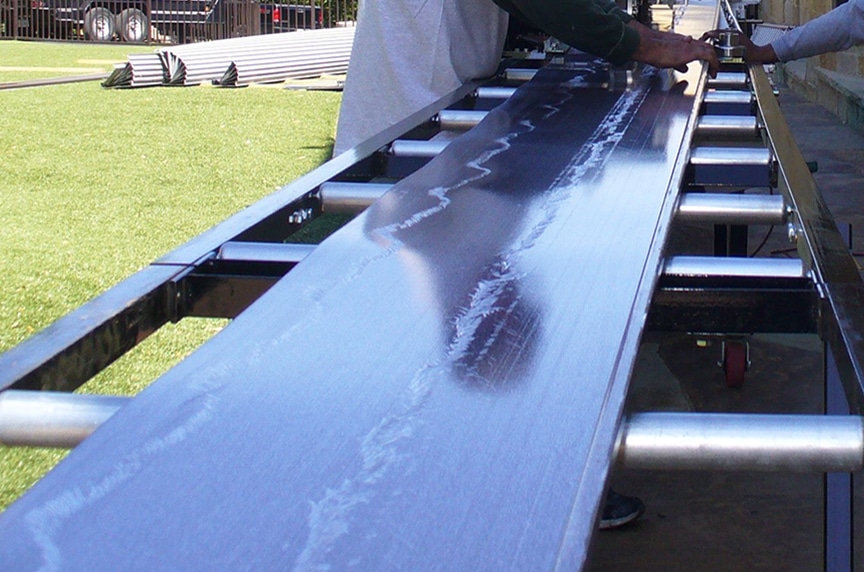
It might be tempting to get cheap or low-cost coil that’s a low grade, but that can lead to more problems for your portable rollforming machine, like not correctly forming the profile, damaging the rollers, or even crashing your machine.
While most metal materials shouldn’t have any defects when you purchase it from a coil supplier, some oil canning or imperfections can happen, so it’s important to keep an eye on it no matter what.
It’s important to know that if you run defective or low-quality coil through your portable rollformer. So, what kinds of issues might you experience issues with the finished panel or with your machine? Let’s talk about some of these issues in more detail.
Material May Not Run Straight Inside the Machine
If the material grade is lower or higher than NTM recommends, the coil may not run straight inside the machine. The coil could be pushed to one side or the other by the forming rollers and cause issues inside the machine, or the profile will be crooked.
Material May Cause Build-Up On Drive or Forming Rollers
Some low-quality material may leave a build-up of paint or galvalume after a while on the forming rollers. If there’s enough build-up, it can stretch out the material as it’s going through the machine or reduce the clearance between rollers and crush the material, even causing the material to jam or crash the machine.
Build-up can also be caused by some metals leaving an oily residue on the drive rollers, causing them to slip on the material as it passes through. Build-up on the rollers can also cause the paint to come off the material.
Wrong Grades of Material Can Damage Rollers or Cause Profiles to Form Improperly
Metal material naturally wants to spring back to its original shape, so there’s a specific amount of pressure and stress applied during the rollforming process so that the profile will hold its shape.
Too much pressure on the wrong grade of material, and you could inadvertently damage it or the rollers. If the material is too light, it won’t form properly to the profile you want and may not install correctly, especially with snap-lock profiles.
Using low-grade material may cause the panel profile to lose its form. The low-grade coil could cause the shear to tear or crush the panel as it exits the machine instead of cutting through it, or even crash the shear completely.
How Can You Fix or Avoid Problems With Low-Quality Metal Coil?
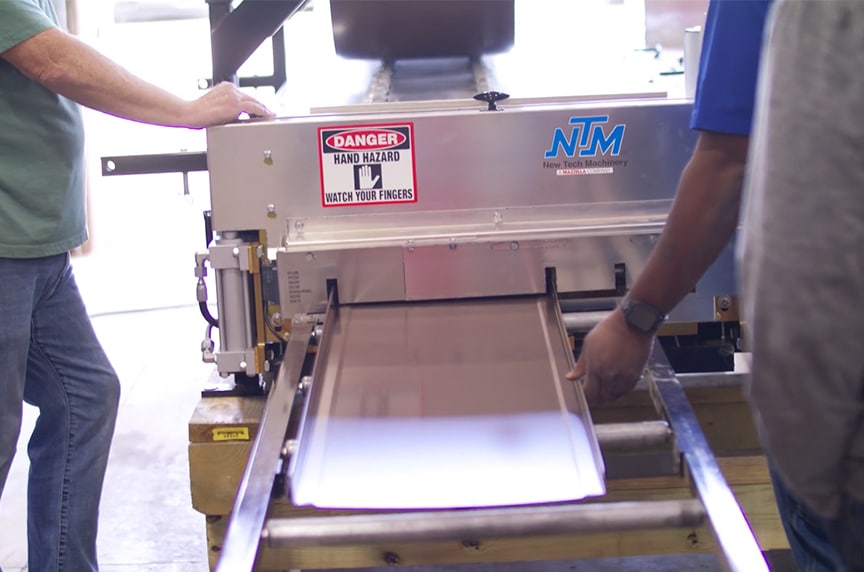
Ensure that your panel is in tolerance. To check the panel profile for tolerance, refer to the cutsheet in your manual for the proper dimensions of the profile and cross-check that the finished product matches those profile specifications.
Make sure you properly feed the coil into your roof panel machine. To do so, ensure it’s lined up straight from the expandable arbor to the entry guide. Slowly jog the material through the machine to ensure it’s going in straight and without any issues. After you’ve run a complete piece through, cut it off, and checked it for straightness and quality, you can continue running the material through.
Stop running any coil if you see imperfections. If the coil you’re using has oil canning, camber, or other defects, or is causing any issues with your machine, stop using it immediately. To check for issues like camber or oil canning, you can cut a 10-foot test piece of material before it’s been formed and lay it on a flat surface to check its straightness.
Contact the NTM Service department, or visit the NTM Service & Support Center, if you need any troubleshooting assistance or technical support in person or over the phone.
Final Thoughts
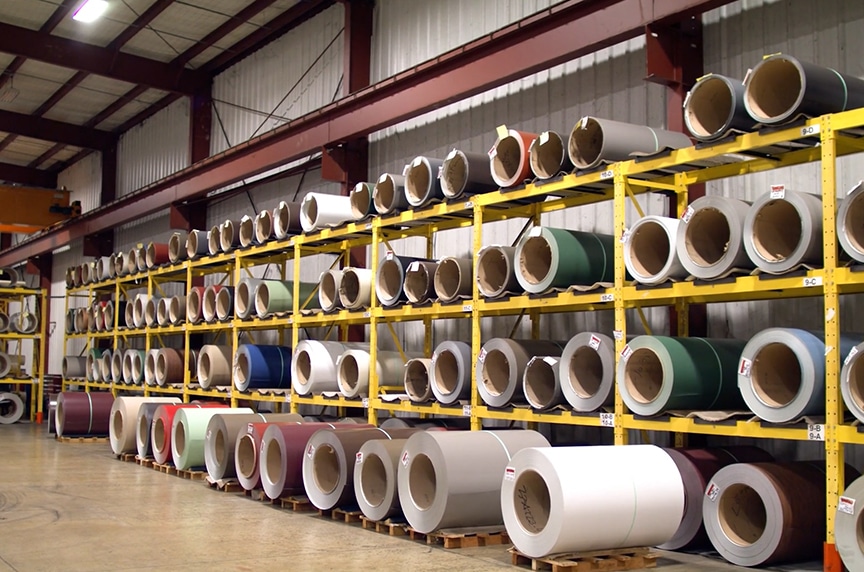
Understanding what materials you can run in your NTM portable rollformer safely helps ensure that you’re not risking damage to your machine or wasting material on panels that may not be installed properly.
Remember to:
- Check which types and thicknesses of materials your roof panel machine can run by reviewing your manual or newtechmachinery.com.
- Check your material for defects or imperfections (like oil canning, camber, incorrect slitting, etc.) BEFORE you use it (or once you notice the issues after running a sample panel) in your portable rollforming machine.
- STOP running any coil immediately if it’s defective or causing issues with your machine.
- Contact one of NTM’s rollforming specialists if you need troubleshooting help or have problems with the material you’re trying to use in your machine.
NTM’s portable rollforming machines are designed to run the most commonly used materials in metal roofing projects, but they can only run some types of metal or specific grades of steel. Our Service department has fixed and helped walk machine operators through fixing all these problems and more, but avoiding these kinds of issues comes from knowing what to look for and what your machine’s capabilities are.
Got a question about using specific materials in your NTM machine? Want to learn more about any of our portable roof panel machines and equipment? Contact us to speak to any of our rollforming specialists or Service team!
